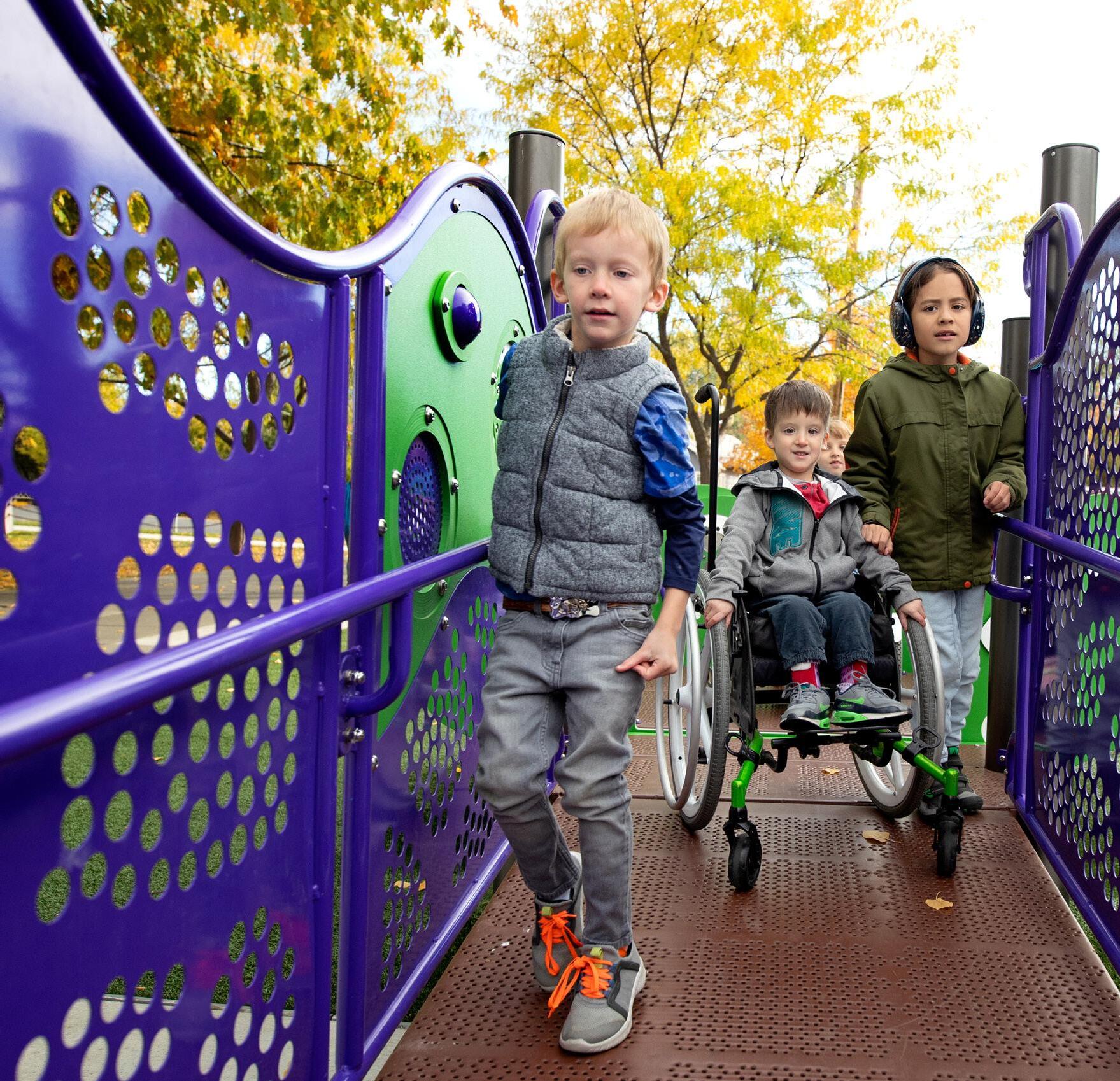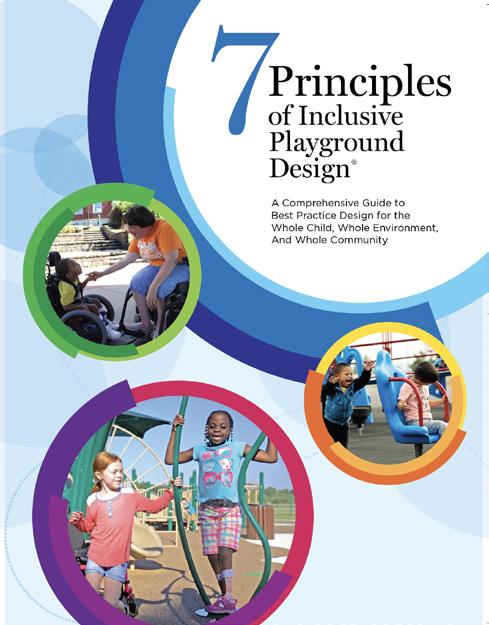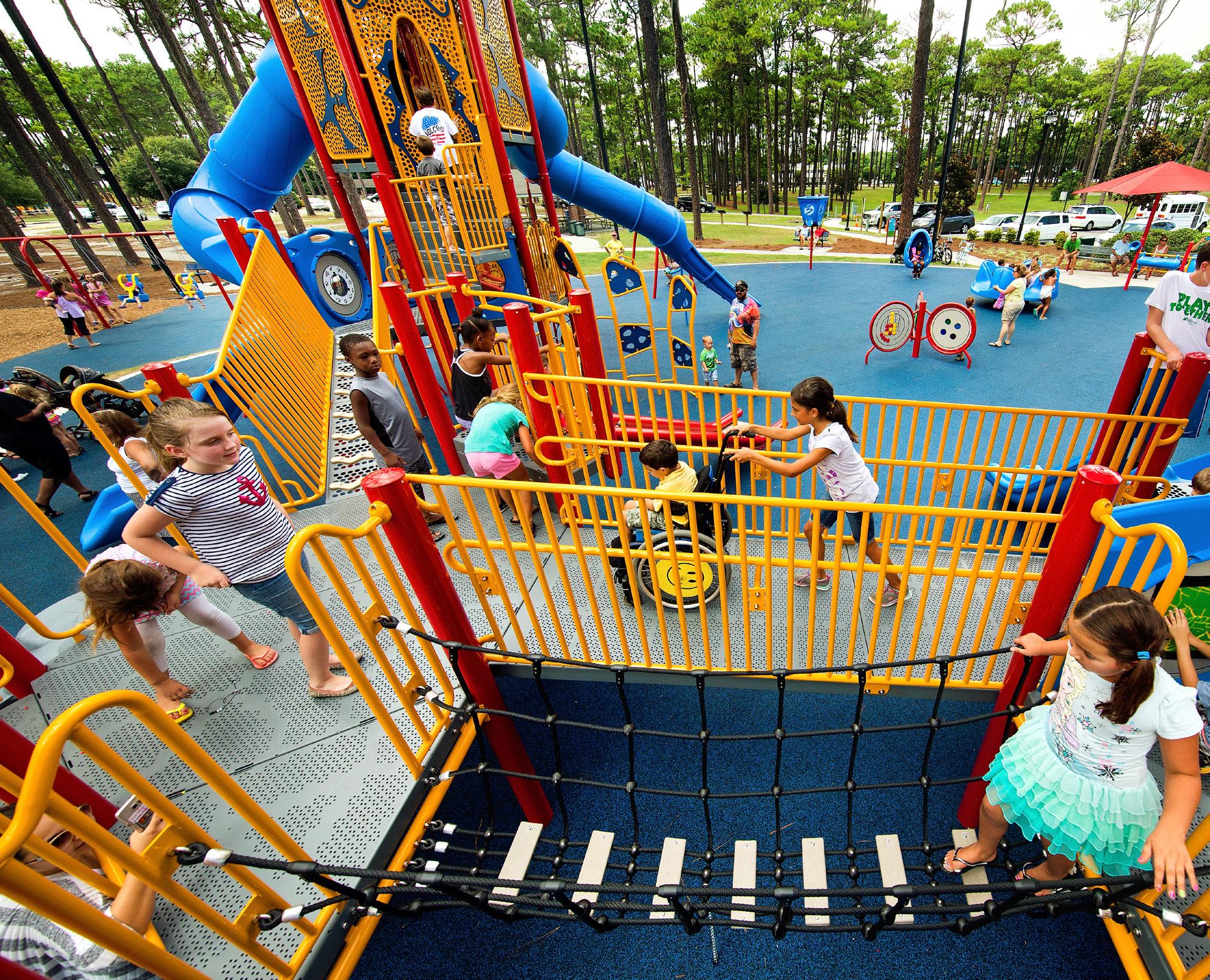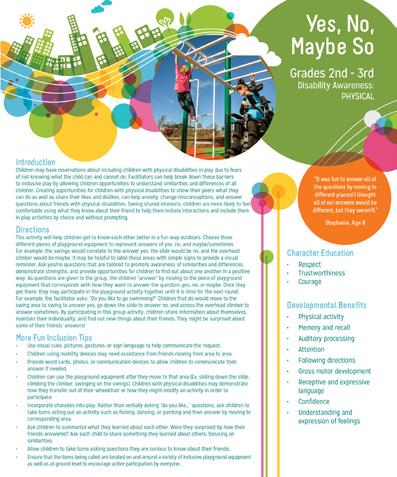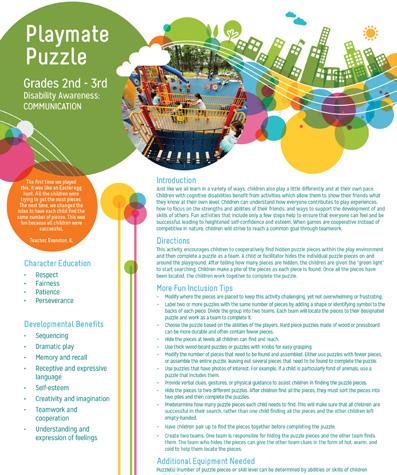A Unique and Comprehensive Inclusion Philosophy
Fostering the Needs of the WHOLE
CHILD
Playgrounds are important community assets where the developmental needs of all children, including those with disabilities, can be secured by thoughtfully providing opportunities for the physical, social-emotional, sensory, cognitive, and communicative benefits of play to occur. Children with disabilities should be able to explore the whole environment and interact with a robust assortment of playground activities with their peers and caregivers. The process of creating truly inclusive and welcoming play experiences should start with an appreciation and understanding of the five domains of child development.
Innovating Evidence-Based WHOLE ENVIRONMENTS
Access does not guarantee inclusion. It is simply an important first step that provides the foundation for inclusion to occur. Inclusively designed whole environments support the needs of the whole child and the unique context of the overall play and recreation environment. The 7 Principles of Inclusive Playground Design® move outdoor play environments beyond minimum accessibility standards to recognize everyone’s right to fully participate and contribute to meaningful
play and recreation opportunities. These guiding principles and considerations have helped thousands of communities eliminate unnecessary expectations in the built environment and align with evidence-based design practices tailored to the needs of all children, including those with disabilities, in outdoor play environments.
Celebrating Inclusion for the WHOLE COMMUNITY
Creating whole environments that ensure the developmental needs of the whole child supports the active participation of people of all ages and abilities.
The 7 Principles of Inclusive Playground Design® create universally designed play environments that respect and value all inherent differences we possess as individuals. This fosters a deeper sense of belonging for all people, regardless of age, race, gender, culture, socioeconomic status, or ability. Our unique backgrounds, abilities, and interests contribute to the richness of whole communities. Investing in inclusive play offers significant benefits to the whole community. Maximize the opportunity to engage the whole community and make the case for inclusion with community advocates, experts, and a variety of stakeholders.
NATIONALDEMONSTRATIONSITE
High-quality outdoor play and recreation environments are essential to community health and wellness. Research indicates that when stakeholders are engaged in the planning process, evidencebased design best practices are implemented with the built environment, and supplemental programming is offered to further enhance user experiences, then positive outcomes occur.
PlayCore’s Center for Outreach, Research, and Education (CORE) leads the National Demonstration Site Network as an important initiative to raise national awareness, recognize projects of excellence, and help communities demonstrate the positive impact they have on community vitality. National Demonstration Sites receive on-site signage, marketing tools, and one-of-akind data services, including site-specific reports to provide a comprehensive view of the outcomes your site contributes to the community.
7 Principles of Inclusive Playground Design®
A Comprehensive Guide to Best Practice Design for the Whole Child, Whole Environment, and Whole Community
Explore the guide to learn:
7 Principles of Inclusive Playground Design Best Practice Implementation:
• Address local priorities, create awareness, and enlist community partners that share your mission and goals.
• Provide a developmentally robust and balanced assortment of playground activities that meet the diverse physical, social-emotional, sensory, cognitive, and communicative needs of all children, including those with disabilities.
• Apply the 7 Principles of Inclusive Playground Design® to the overall environmental design.
• Offer programming, activities, special events, and/or other initiatives to further create awareness and foster friendships.
• Latest research findings and data to support inclusive play initiatives
• Playground considerations to foster the needs of the whole child
• Model inclusive play case examples
• Evidence-based design principles for the whole environment
• Steps to develop a comprehensive plan to celebrate inclusion for the whole community
• Planning and disability awareness resources
• Projects of excellence and outcomes to demonstrate impact
Additional Resources include:
• Professional development training modules
• Comprehensive park checklist to expand inclusion across settings
• 2 Play Together®: Playground Activities to Foster Friendships through Inclusive Play digital program guidebook
• PlayCore’s National Demonstration Site Program and Data Services Lab
The 7 Principles of Inclusive Playground Design provides evidence-based design best practices for creating outdoor play environments that address the physical and social inclusion of people of all ages and abilities. The purpose of the program is to help communities create more usable environments, for more people, to the greatest extent possible.
Inclusive play is our passion and purpose. For close to two decades, PlayCore has partnered with leading experts at Utah State University’s Institute for Disability Research, Policy & Practice to champion thousands of inclusive play and recreation destinations across the world.
Our evidence-based design best practice guidebook helps communities move beyond the minimum accessibility standards to ensure that people of all ages and abilities can participate in meaningful outdoor play experiences and secure the the social benefits of inclusion.
Research & Programming in partnership with:
Research
Since the initial launch in 2007, the 7 Principles of Inclusive Playground Design® have continued to evolve based on the latest research and product innovations. Through our national partnership with Utah State University’s Institute for Disability Research, Policy & Practice and their Research Lab at Edith Bowen Laboratory School, PlayCore supports ongoing research to gain further understanding of best practices and understand the diverse needs of communities.
Playground Design Resource & Inclusive Play Programming Guide
Evidence-Based Design Practices
Whole communities start with inclusively designed whole environments that carefully meet the diverse needs of the whole child As the industry’s only evidence-based design best practices, the 7 Principles of Inclusive Playground Design®, detailed within the guidebook, provide a unique and comprehensive design philosophy for creating inclusive, intergenerational play environments in community parks and school destinations.
Developed in partnership with Utah State University’s Institute of Disability Research, Policy, & Practice, the 7 Principles of Inclusive Playground Design move outdoor play environments beyond minimum accessibility
and recognize everyone’s fundamental right to the developmental benefits of play. These principles have carefully tailored the original adult-focused Principle of Universal Design, created by the Center of Universal Design at North Carolina State University for indoor environments, to what children want to experience, feel, and “Be” fair, included, smart, independent, safe, active, and comfortable during meaningful play.
Playground Programming to Promote Inclusive Play
Inclusive play programming can increase usage at your park, while promoting social equity in your community.
2 Play Together® offers fifteen inclusive playground activities designed to create awareness, break down barriers, and foster inclusive friendships. Use this unique resource to activate inclusive playgrounds during special events, after school programs, summer camps and more!
Program Highlights:
• Disability awareness resources
• Character education tips
• Inclusive playground activities for PreK-5 grades
• Inclusion tips and resources for educators, programmers, and advocates
• Supportive research


